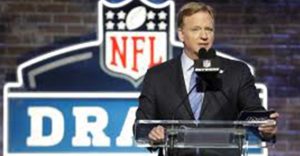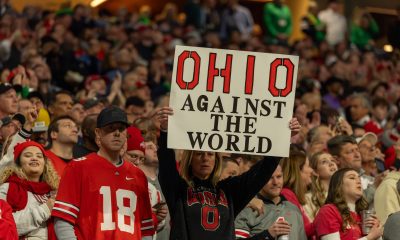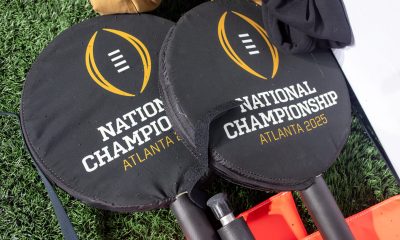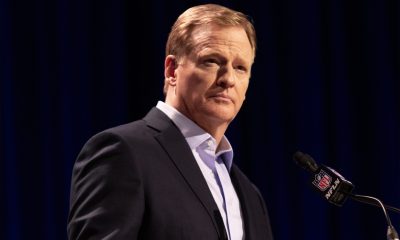Black History
Three Minneapolis women who broke cheerleading color barriers
MINNESOTA SPOKESMAN-RECORDER — Prior to 1923, cheerleading had been an exclusively White male activity. That year, the University of Minnesota (U of M) became the first school in America to allow female cheerleaders. It remained an all-White activity there, however, until Dana Purdue Williams became the first African American cheerleader at the U of M in 1975.
By Ken Foxworth
Two trailblazing cheerleaders were recognized at St. Peter’s Church in Minneapolis: (l-r) Harriet Bowman Solomon, Gwendolyn Morrow Fraction; Rev. Carla Mitchell, pastor of St. Peter’s; and former Minneapolis Public Schools.superintendent Dr. Carolyn Johnson.
Few people realize that not only did women athletes cheerleading at sporting events originate right here in Minnesota, but also several strong African American women made Black history here by breaking the cheerleading color barrier.
Prior to 1923, cheerleading had been an exclusively White male activity. That year, the University of Minnesota (U of M) became the first school in America to allow female cheerleaders. It remained an all-White activity there, however, until Dana Purdue Williams became the first African American cheerleader at the U of M in 1975.
Below are Williams’ story and two other earlier cheerleading firsts that inspired her to pursue her own dream.
Gwendolyn Morrow Fraction
A 1950 Minneapolis North High School graduate, Fraction became in 1949 the first African American cheerleader in the state of Minnesota. Upon graduation, she worked for Northwestern Bell and in banking, insurance, and accounting. At age 85, Fraction still volunteers in the community and is known for her beautiful voice.
Following in her mother’s footsteps, Fraction’s daughter Cindy became a cheerleader for Washburn High School, graduated in 1983, and is now program director of research at the University of St. Thomas.
Harriet Bowman Solomon
A 1951 Central High School graduate, Solomon watched her brothers play football and other extracurricular activities. Her brother Earl Wesley Bowman attended college on a football scholarship, played baseball at a major university, played semi-pro football, and became the first African American president of Minneapolis Community College. Her other brother, Henry Bowman, was a member of the Tuskegee Airmen as well as a Big 10 regional player.
Harriet wanted to establish her own legacy and accomplished this through cheerleading. She was the first African American cheerleader at Minneapolis Central High in 1950 and later worked for Northwestern Bell. After retirement in 1995, she volunteered at McRae Park.
Edward C. Soloman Park near Lake Nokomis in Minneapolis was named after Harriet’s husband for his outstanding contribution to the Minneapolis park system as a board member and a volunteer at McRae Park
Dana Purdue Williams
This 1975 Washburn High School graduate who went on to become the U of M’s first Black cheerleader says that at an early age she watched her mother, Harriet Bowman Solomon, cheerleading in the kitchen, living room, or anywhere else where she had space and a chance. She also watched her best friend Gwendolyn Morrow Fraction doing the same, all while having fun.

MSR News Online/MSR News Online Dana Purdue Williams as a U of M cheerleader in 1975
Williams recalls her mother enrolling her in ballet classes at the tender age of six. At age 10 she attended the Minnesota Dance Theater children’s workshop, where she became an apprentice and mastered the program by age 15.
She thought all of that experience and her mom’s example put her in position to make Minnesota Gopher history. “When I saw the 1975 tryout poster for the University of Minnesota cheerleading squad,” Williams says, “I truly knew that I was ready to go complete. I saw myself being a Gopher cheerleader at the age of seven. I planned this all my life, and no one was going to stop me from pursuing my dream!”
As Williams took her inspiration from predecessors Fraction and Solomon, so did she take their career advice, becoming a flight attendant for 40 years at Delta/Northwest Orient Airlines. She now works as an ambassador for Delta Airlines, visiting their headquarters in Atlanta, GA to inspire and motivate future flight attendants to be all that they can be for the customers and the company.
Williams has also has been giving back to her community through the years by helping young inner-city girls and working with football camps at McRae Park in South Minneapolis.
Cheerleading history’s importance
The most important thing in sports is not just the games and their players — it’s the fans and their enthusiasm that makes the games so wonderful. And who is it that gets the fans yelling themselves raw cheering on their teams to victory? That’s what the cheerleaders do, though rarely do they get credited for their athletic contributions to the sports world.
Not so long ago, cheerleading was the only opportunity for girls to be seen and heard as athletes at their schools, colleges and universities. Before the Title IX federal civil rights law came into effect in 1973, girls did not have the same opportunities as boys to develop their skills in sports. The only thing they could do was to go out on that field and cheer on their team.
Fraction, Solomon and Williams all made important strides for Black women athletes between 1949 and 1975. Thanks to them and many others like them, girls around the Twin Cities can now aspire not only to become cheerleaders in high school and their respective universities and colleges. Now they can aspire to compete as athletes in any sport that captures their dreams.
This article originally appeared in the Minnesota Spokesman-Recorder.
Activism
Oakland Post: Week of December 31, 2025 – January 6, 2026
The printed Weekly Edition of the Oakland Post: Week of – December 31, 2025 – January 6, 2026

To enlarge your view of this issue, use the slider, magnifying glass icon or full page icon in the lower right corner of the browser window.
Activism
Big God Ministry Gives Away Toys in Marin City
Pastor Hall also gave a message of encouragement to the crowd, thanking Jesus for the “best year of their lives.” He asked each of the children what they wanted to be when they grow up.

By Godfrey Lee
Big God Ministries, pastored by David Hall, gave toys to the children in Marin City on Monday, Dec. 15, on the lawn near the corner of Drake Avenue and Donahue Street.
Pastor Hall also gave a message of encouragement to the crowd, thanking Jesus for the “best year of their lives.” He asked each of the children what they wanted to be when they grew up.
Around 75 parents and children were there to receive the presents, which consisted mainly of Gideon Bibles, Cat in the Hat pillows, Barbie dolls, Tonka trucks, and Lego building sets.
A half dozen volunteers from the Big God Ministry, including Donnie Roary, helped to set up the tables for the toy giveaway. The worship music was sung by Ruby Friedman, Keri Carpenter, and Jake Monaghan, who also played the accordion.
Big God Ministries meets on Sundays at 10 a.m. at the Mill Valley Community Center, 180 Camino Alto, Mill Valley, CA Their phone number is (415) 797-2567.
Activism
First 5 Alameda County Distributes Over $8 Million in First Wave of Critical Relief Funds for Historically Underpaid Caregivers
“Family, Friend, and Neighbor caregivers are lifelines for so many children and families in Alameda County,” said Kristin Spanos, CEO, First 5 Alameda County. “Yet, they often go unrecognized and undercompensated for their labor and ability to give individualized, culturally connected care. At First 5, we support the conditions that allow families to thrive, and getting this money into the hands of these caregivers and families at a time of heightened financial stress for parents is part of that commitment.”

Family, Friend, and Neighbor Caregivers Can Now Opt Into $4,000 Grants to Help Bolster Economic Stability and Strengthen Early Learning Experiences
By Post Staff
Today, First 5 Alameda County announced the distribution of $4,000 relief grants to more than 2,000 Family, Friend, and Neighbor (FFN) caregivers, totaling over $8 million in the first round of funding. Over the full course of the funding initiative, First 5 Alameda County anticipates supporting over 3,000 FFN caregivers, who collectively care for an estimated 5,200 children across Alameda County. These grants are only a portion of the estimated $190 million being invested into expanding our early childcare system through direct caregiver relief to upcoming facilities, shelter, and long-term sustainability investments for providers fromMeasure C in its first year. This investment builds on the early rollout of Measure C and reflects a comprehensive, system-wide strategy to strengthen Alameda County’s early childhood ecosystem so families can rely on sustainable, accessible care,
These important caregivers provide child care in Alameda County to their relatives, friends, and neighbors. While public benefits continue to decrease for families, and inflation and the cost of living continue to rise, these grants provide direct economic support for FFN caregivers, whose wages have historically been very low or nonexistent, and very few of whom receive benefits. As families continue to face growing financial pressures, especially during the winter and holiday season, these grants will help these caregivers with living expenses such as rent, utilities, supplies, and food.
“Family, Friend, and Neighbor caregivers are lifelines for so many children and families in Alameda County,” said Kristin Spanos, CEO, First 5 Alameda County. “Yet, they often go unrecognized and undercompensated for their labor and ability to give individualized, culturally connected care. At First 5, we support the conditions that allow families to thrive, and getting this money into the hands of these caregivers and families at a time of heightened financial stress for parents is part of that commitment.”
The funding for these relief grants comes from Measure C, a local voter-approved sales tax in Alameda County that invests in young children, their families, communities, providers, and caregivers. Within the first year of First 5’s 5-Year Plan for Measure C, in addition to the relief grants to informal FFN caregivers, other significant investments will benefit licensed child care providers. These investments include over $40 million in Early Care and Education (ECE) Emergency Grants, which have already flowed to nearly 800 center-based and family child care providers. As part of First 5’s 5-Year Plan, preparations are also underway to distribute facilities grants early next year for child care providers who need to make urgent repairs or improvements, and to launch the Emergency Revolving Fund in Spring 2026 to support licensed child care providers in Alameda County who are at risk of closure.
The FFN Relief Grants recognize and support the essential work that an estimated 3,000 FFN caregivers provide to 5,200 children in Alameda County. There is still an opportunity to receive funds for FFN caregivers who have not yet received them.
In partnership with First 5 Alameda County, Child Care Payment Agencies play a critical role in identifying eligible caregivers and leading coordinated outreach efforts to ensure FFN caregivers are informed of and able to access these relief funds.FFN caregivers are eligible for the grant if they receive a child care payment from an Alameda County Child Care Payment Agency, 4Cs of Alameda County, BANANAS, Hively, and Davis Street, and are currently caring for a child 12 years old or younger in Alameda County. Additionally, FFN caregivers who provided care for a child 12 years or younger at any time since April 1, 2025, but are no longer doing so, are also eligible for the funds. Eligible caregivers are being contacted by their Child Care Payment Agency on a rolling basis, beginning with those who provided care between April and July 2025.
“This money is coming to me at a critical time of heightened economic strain,” said Jill Morton, a caregiver in Oakland, California. “Since I am a non-licensed childcare provider, I didn’t think I was eligible for this financial support. I was relieved that this money can help pay my rent, purchase learning materials for the children as well as enhance childcare, buy groceries and take care of grandchildren.”
Eligible FFN caregivers who provided care at any time between April 1, 2025 and July 31, 2025, who haven’t yet opted into the process, are encouraged to check their mail and email for an eligibility letter. Those who have cared for a child after this period should expect to receive communications from their child care payment agency in the coming months. FFN caregivers with questions may also contact the agency they work with to receive child care payments, or the First 5 Alameda help desk, Monday through Friday, from 9 a.m. to 5:00 p.m. PST, at 510-227-6964. The help desk will be closed 12/25/25 – 1/1/26. Additional grant payments will be made on a rolling basis as opt-ins are received by the four child care payment agencies in Alameda County.
Beginning in the second year of Measure C implementation, FFN caregivers who care for a child from birth to age five and receive an Alameda County subsidized voucher will get an additional $500 per month. This amounts to an annual increase of about $6,000 per child receiving a subsidy. Together with more Measure C funding expected to flow back into the community as part of First 5’s 5-Year Plan, investments will continue to become available in the coming year for addressing the needs of childcare providers in Alameda County.
About First 5 Alameda County
First 5 Alameda County builds the local childhood systems and supports needed to ensure our county’s youngest children are safe, healthy, and ready to succeed in school and life.
Our Mission
In partnership with the community, we support a county-wide continuous prevention and early intervention system that promotes optimal health and development, narrows disparities, and improves the lives of children from birth to age five and their families.
Our Vision
Every child in Alameda County will have optimal health, development, and well-being to reach their greatest potential.
Learn more at www.first5alameda.org.
-

 Bay Area3 weeks ago
Bay Area3 weeks agoPost Salon to Discuss Proposal to Bring Costco to Oakland Community meeting to be held at City Hall, Thursday, Dec. 18
-

 Activism3 weeks ago
Activism3 weeks agoMayor Lee, City Leaders Announce $334 Million Bond Sale for Affordable Housing, Roads, Park Renovations, Libraries and Senior Centers
-

 Activism4 weeks ago
Activism4 weeks agoOakland Post: Week of December 10 – 16, 2025
-

 Activism3 weeks ago
Activism3 weeks agoOakland School Board Grapples with Potential $100 Million Shortfall Next Year
-

 Arts and Culture3 weeks ago
Arts and Culture3 weeks agoFayeth Gardens Holds 3rd Annual Kwanzaa Celebration at Hayward City Hall on Dec. 28
-

 Activism3 weeks ago
Activism3 weeks ago2025 in Review: Seven Questions for Black Women’s Think Tank Founder Kellie Todd Griffin
-

 Advice3 weeks ago
Advice3 weeks agoCOMMENTARY: If You Don’t Want Your ‘Black Card’ Revoked, Watch What You Bring to Holiday Dinners
-

 Activism3 weeks ago
Activism3 weeks agoAnn Lowe: The Quiet Genius of American Couture






















































